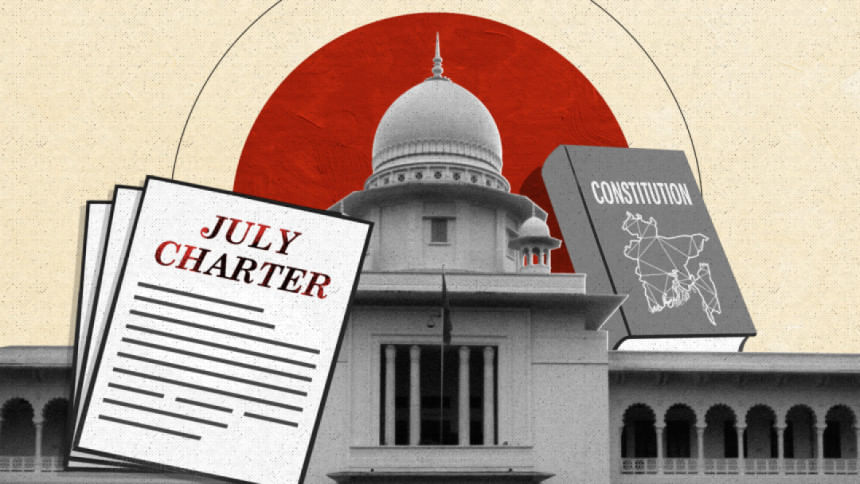July charter implementation: Commission races against time to find out ways

With only six days remaining before its extended tenure ends, the National Consensus Commission has yet to find a viable mechanism to ensure that the proposed constitutional reforms under the July charter will be implemented.At a lengthy meeting yesterday, the commission discussed with legal experts the ways to ensure the charter's implementation as it is preparing to submit its final recommendations to the government.Commission members acknowledged that the main challenge lies in the absence of...
With only six days remaining before its extended tenure ends, the National Consensus Commission has yet to find a viable mechanism to ensure that the proposed constitutional reforms under the July charter will be implemented.
At a lengthy meeting yesterday, the commission discussed with legal experts the ways to ensure the charter's implementation as it is preparing to submit its final recommendations to the government.
Commission members acknowledged that the main challenge lies in the absence of any legal or historical precedent, either in Bangladesh or abroad, for binding a future parliament to specific constitutional actions.
A legal expert who attended the meeting told The Daily Star that under a parliamentary democracy, no legislature can be compelled in advance to act in a predetermined way.
Questions also arose over whether granting the next parliament "constituent power" would make it legally bound to approve the charter's reform proposals as they stand.
The unpredictable composition of the next parliament has also contributed to the challenges. The next government may not have a two-third majority, without which passing constitutional reforms would largely depend on political goodwill and cooperation.
The commission is scheduled to meet again this morning and may hold further consultations with constitutional experts if necessary.
2 OPTIONS ON TABLE
According to commission sources, two options were discussed in detail.
The first would stipulate that if the reform proposals are not implemented within 270 days, the parliament would be dissolved.
The second would make the reforms automatically effective and incorporated into the constitution after that period.
However, the meeting members could not agree on either option as both were seen as problematic, legally and politically.
Another constitutional expert who attended the meeting said the core disagreement was over what should happen if the reforms are not implemented within the 270-day deadline.
"Legally, dissolving parliament might be valid, but politically it would be unacceptable. It could trigger another constitutional crisis and possibly require a new national election, an outcome that would be costly and impractical."
The expert said automatically incorporating the reforms into the constitution without parliamentary approval would also be unrealistic. "We are not preparing any draft reform bill. Such a bill should be debated and passed by elected representatives in parliament," the expert said.
A third option -- forming a Constitution Reform Assembly before convening parliament -- was also discussed but rejected as unfeasible since it would require the interim government to stay in power longer.
"That would be politically unacceptable. So far, we have not found any solution that is both legally valid and politically acceptable," the expert said, hinting that the commission might retain the 270-day deadline without specifying consequences for non-compliance.
On the proposed referendum, the expert added, "It could be held on the same day as the national election or earlier. That decision will rest with the government."
When asked about international precedents, the expert said, "In theory, if a parliament fails to complete such work, it should be dissolved and a new Constituent Assembly elected. That would be logical, but not necessarily practical in our situation."
The commission is also planning to propose that the government first issue a July Charter Implementation (Constitutional Reform) Order, followed by an ordinance to conduct a national referendum.
Once a new parliament is formed, it will function as a Constitution Reform Council for its first nine months, debating and approving the constitutional reforms while continuing its regular legislative duties.
MEETING WITH NCP
A five-member delegation of the National Citizen Party (NCP) met the commission yesterday morning and demanded that the legal basis, and content of the July charter's implementation order be made public.
Speaking to reporters at the LD Hall of the parliament, NCP Member Secretary Akhter Hossen said, "The text, content, and scope of its effectiveness should be explained to the nation."
He confirmed that the commission is drafting the order to operationalise the charter, calling it a positive step, but noted that the draft text has yet to be presented to the party.
Akhter stressed that the implementation order must be "free from political bias" and "belong to the entire nation".
Explaining why the NCP has not yet signed the July charter, he said, "Signing is only a formality. Without implementation, it is meaningless. The July charter represents the sovereign will of the people, not a mere political document."
He added that Chief Adviser Prof Muhammad Yunus would issue the implementation order, followed by a referendum allowing the next parliament to exercise constituent power. "After that, the parliament will incorporate the proposed reforms into the constitution and announce the reformed 2026 constitution," he said.
"Without a clear understanding of the order, the referendum alone cannot ensure proper implementation.
"We believe that full implementation of the July charter is the only way to overcome the current national crisis," he added.
On possible electoral alliances, Akhter said the NCP has not yet begun formal talks with any party, but it is open to such discussions "if necessary for the national interest".
Contacted, Prof Ali Riaz, vice-president of the consensus commission, told The Daily Star that the NCP representatives have expressed willingness to sign the document but sought clarifications on several proposals.
"We have sent these points to legal experts for review," he said. "We are proceeding carefully after considering both the positive and negative aspects. The main goal is to get all parties to sign."